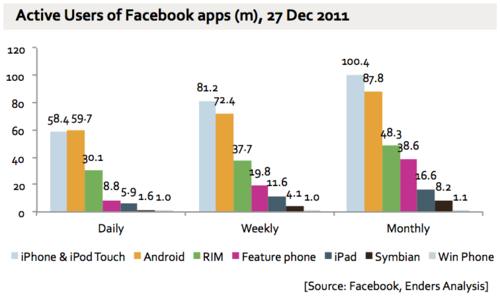A research study that is about to be published by Enders Analysis points out that Facebook is now seeing more than 300M Monthly Active Users (MAU) on their mobile applications.

These numbers are staggering and clearly point to the growing trend of digital media consumption on mobile devices. It will be interesting to see where these numbers end up at the end of 2012 given this recent benchmark. What is even more interesting though is the information about native application usage vs mobile web usage. The breakdown by device usage isn’t that surprising (iOS and Android are still on top), but the fact that native application usage is far exceeding mobile web usage should surprise the masses.
We continue to hear on a regular basis that the browser is the killer mobile application of the future and that mobile web is where all companies should be focusing their attention. Although I agree with the need for mobile web, it is important to consider it as part of a larger mobile strategy that also places considerably more emphasis on the native application experience. The Enders Analysis has done a good job comparing Facebook’s mobile web usage and native application usage. It is definitely worth while reading this blog post:
Facebook’s 300m app users - By Enders Analysis
How does this compare to mobile web users? Facebook gave a number for total users of 800m and mobile users of 350m back at the end of September, at which point there were around 250m MAUs of the apps (i.e. 350m people used Facebook on mobile of which 250m used the apps and 100m used the mobile web). In other words 70% of mobile users and 30% of all users used apps to access Facebook.
Given that Facebook now has so many mobile users, their numbers are a good source of information for general industry trends. If these numbers are correct and that 70% of mobile users are using apps over mobile websites, it is important for our clients and future clients to dedicate more time and resources to promoting and selling their native applications. Mobile web is an easy and cost effective alternative, but at the end of the day it is not what your readers are asking for.
All this being said, we are not putting the blinders on for the future of HTML5. We think that HTML5 is going to play a big part in the future of mobile application development. HTML5 is going to be most useful as a way to unify development efforts and end-user-experience as a web object within the application frame and not as a standalone site that is viewed by user visiting from a web browser. Users clearly like the added functionality and ease of use/discovery that an application on their mobile desktop brings to the table and we as developers and publishers need to make sure we understand this demand.














